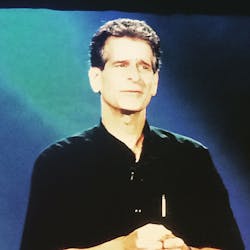Dean Kamen doesn’t pursue an idea unless people say he’s crazy. Without this challenge this American inventor and entrepreneur may never have pursued his many engineering accomplishments, including: HomeChoice, the portable home dialysis machine; the iBOT mobility wheelchair that can rise to six feet tall or “walk” up stairs; the two-wheeled, self-balancing Segway human transporter; and the prosthetic arm, developed for DARPA, that has fine motor control and will advance the quality of life for soldiers who have lost one or both of their arms fighting for the safety and security of this country.
Kamen has hundreds of patents, and they are not just cool ideas, but they actually change lives. Take, for example, the fact that every 20 seconds a child dies from a water-related disease. People living in places of poverty often don’t have the infrastructure to access clean water. So Kamen decided to rethink the situation and figured out how to create a water purifier, called Slingshot, that, while distilling, uses its own internal energy recovery to purify any water source from seawater to sewage. The real problem was getting Slingshot to the people who needed it. That’s where an educated community and gracious professionalism comes in.
For example, last year, when the Caribbean island of Dominica was hit by a storm that left villages in a state of emergency, Kamen called FedEx founder Fred Smith to get three of the Slingshot systems flown there. By the next afternoon they were producing clean drinking water: “Proving that technology at the most fundamental level, if properly implemented by people who get it, can change lives and the world,” Kamen said during his keynote address at Rockwell Automation’s TechED conference taking place this week in Orlando.
Kamen surely gets it. And, in addition to making more “stuff “of his own, he’s mobilizing the masses from academia to manufacturing and even the President of the United States, to reexamine our own current situation and the country’s future. That’s the basis behind For Inspiration and Recognition of Science and Technology (FIRST), which Kamen founded in 1989, using robotics as a way to introduce science and technology to young minds in fun, creative ways. What started as a grassroots competition with a small group of kids working together to dream up, design and build robots, has evolved into a global competition spanning 86 countries and 46,000 teams. The kids are mentored by engineering superstars who are there to encourage and inspire new career goals.
“Kids will do fine in this world and will get good at anything that adult role models make them feel is important,” Kamen said. “That’s why there’s no shortage of entertainers and ball bouncers.” Kamen is referring to the fact that as a society we celebrate Oscar-winning actors and professional athletes.
“Every year I [say to] the president, let’s celebrate science and technology [professionals], they deserve the same recognition as people who are good at bouncing a ball.” The difference is that the FIRST kids grow up to create a better quality of life and standard of living. “The world needs to make heroes out of the right people.”
Research shows that kids participating in the FIRST program are 50 percent more likely to attend college and three times more likely to major in engineering. In addition, 30 percent of the FIRST team members are females and minorities. These FIRST alumni are four times more likely to pursue technology or engineering majors.
We Can Change the World
Realizing the potential of FIRST, Kamen recently approached global business and political leaders and asked them to support a new initiative, called FIRST Global, which is a united effort to teach kids around the world the same language of math, science and engineering, showing them how to work together on common issues like global warming, food sustainability and healthcare.
Kamen is working on the messaging for this global movement, which is not about a robot competition, rather it is a universal language spoken by every nation on earth, and a roadmap that leads straight to engineering.
We can create a global network that for the first time in history allows a generation of kids to grow up communicating and cooperating as we give them tools to turn their vision into reality,” Kamen said. “When kids have tools, vision and hope they don’t do what they did yesterday.”
Kamen ended his talk with an emotional call to action to everyone in the room: “It’s time for the technology community to answer the call and fix the community.”

